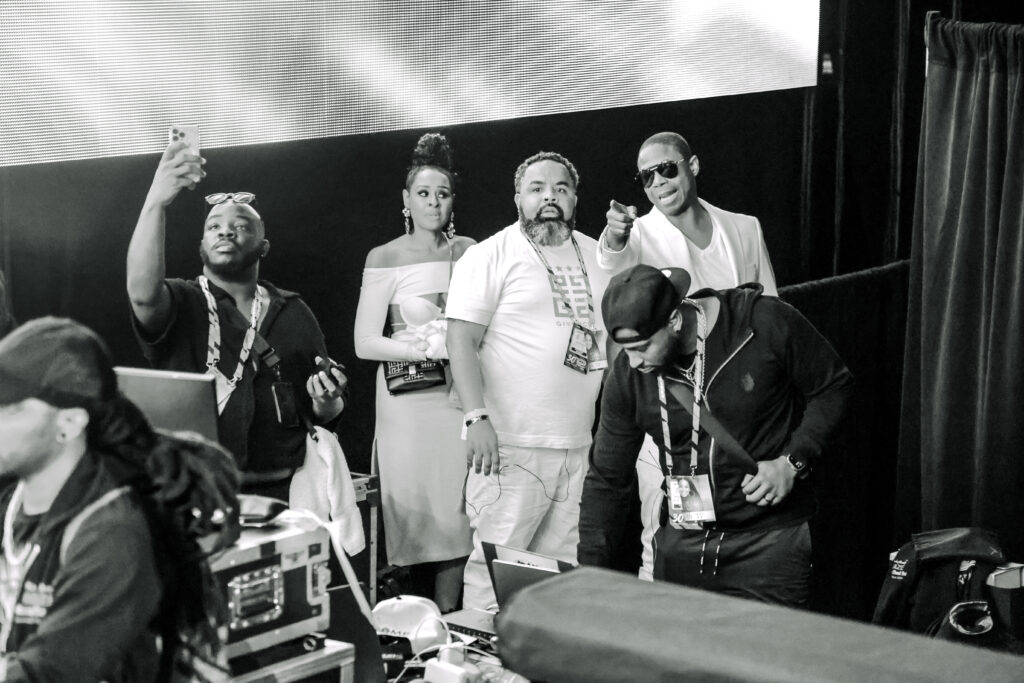What does Black Joy mean to you? What does home, mean to you? For me, it means the freedom to express yourself and be yourself in a safe space where it’s understood, welcomed, and familiar. That’s what the Essence Festival means to me.

Growing up in New Orleans, Louisiana I remember watching my mom and older cousins get all dressed up to go to Essence Fest and the Zulu Ball making me so excited to grow up because I couldn’t wait to attend. I finally got my chance in 1998 at fifteen years old, and my cousin and I picked out our matching outfits to go see Usher with our moms. It was his first Essence Festival appearance and he performed for their Luther Vandross tribute. I remember being in awe at the sea of celebratory Blackness around every corner, from the mainstage to the super lounges. It quickly became my favorite festival, and I have been making priceless Essence memories ever since.
Essence Magazine was founded in 1970 with the intention of establishing itself as a mainstream media platform that amplified the experience of Black women. And that, it did. One day, while in talks of a possible anniversary celebration, popular Jazz producer George Wien met with Essence Magazine co-founder Ed Lewis and implied that “No one comes to New Orleans for Fourth of July weekend unless they have a reason. Have you ever thought about hosting a festival?”
And then, after over two decades of Essence’s success in print, The Essence Music Festival was born, launching in 1995 as what was originally supposed to be a one-time musical celebration of the 25th anniversary of the magazine. However, the impact of the inaugural festival was so strong, that it returned the next year, and the next year, and eventually became one of the largest annual events of its kind that celebrates Black culture on such a grand scale. The Essence Music Festival was fueled by the lack of representation and exposure to Black artistry on mainstream media platforms, specifically MTV. It wasn’t until the release of Michael Jackson’s “Billie Jean” and the public backlash that followed, which prompted MTV to not only recognize the value in Michael Jackson but also Black music across the board and see the value in viewership that followed. Ed Lewis and his team at Essence Magazine saw a prime opportunity to become a beacon of Black greatness and create a space where we could celebrate ourselves.

The inaugural festival featured a series of evening concerts from artists such as Patti Labelle, Aaliyah, The Ohio Players, and of course the one and only Frankie Beverly and Maze who went on to be the closing act for the Essence Festival for fifteen consecutive years. Familiarly nicknamed “Auntie-Con”, the festival eventually developed a reputation where the “grown and sexy” come to congregate. But in 2017, the release of the blockbuster hit “Girls Trip” shifted the lens of the Essence Music Festival to a more diverse audience that bridges age gaps and reaches across generations.
Aside from the evening concerts which have served as the festival’s anchor for decades, there have been several extensions along the way. Throughout the weekend on Saturday and Sunday afternoons, there are workshops and activations taking place inside the convention center and across the city, designated to highlight a variety of cultural experiences including but not limited to fashion, beauty, and health and fitness. They have also recently implemented the Essence Film Festival by Essence Studios, Essence Wellness House, Essence Authors, Essence Food and Wine Festival, and The Suede: Men’s Experience which was initiated to create a more inclusive environment for Black men during Essence weekend.
Many wonder, after all these years, why still New Orleans? In 2005, Hurricane Katrina devasted the Gulf Coast leaving it almost inhabitable for weeks and months. Annual events that were native to New Orleans such as Mardi Gras, and Jazz Fest were indefinitely postponed for their following 2006 seasons, while the Essence Music Festival decided to temporarily relocate to Houston, Texas, which was also one of the major cities that many evacuees had been recently transposed to. Even despite the widespread destruction from Hurricane Katrina, the Essence Festival family soon realized that much of its success was due to the uniqueness of New Orleans, the way the city is easy to navigate for locals and tourists alike, as well as it’s historical ties to our ancestors and sense of community that made every step you take feel like home.

In 1619, with the inception of the African Slave trade, the Port of Orleans became a bustling location of prosperity off of the backs of Black bodies. On Sundays, Louisiana slaves were given the day off in honor of the sabbath, and they used that time to gather and celebrate their expressions of religion and music. Congo Square, located in the heart of New Orleans, is considered a historical landmark where people of color still meet to share their cultural traditions. Not only is it the birthplace of jazz, and a constant and ever-flowing oasis of Black culture, but the city of New Orleans just might be one of the closest places we all still have to call home. The place where our traditions ring loud and proud, because our freedom to express ourselves and be ourselves, is embedded in the streets. This is why when you get there, you immediately feel at home…because you are.
The Essence Festival has established itself as a safe space for Black fellowship, jubilation, and joy, with no boundaries in recognizing the expansiveness of Black artistry and giving back to the community it serves. Last year’s 2023 festival created 3,605 jobs and contributed $327 million to the local New Orleans economy, as well as $120 million to local business spending. The importance of the Essence Festival to the city and the people of New Orleans is undeniable, and yet still not beyond criticism. New Orleans natives take tradition very personally, especially Post-Katrina, and have always walked a fine line between being the warm welcoming bosom where the world comes to rest their head, or being portrayed as a caricature of culture. This year’s 30th Essence Festival Celebration was dedicated to the city and its people including mainstage performances from New Orleans natives such as Teedra Moses, Dawn Richard, Luke James, Tank and the Bangas, and the long-awaited Hot Boz reunion on Friday night. The weekend continued with performances from superstars such as Usher, Janet Jackson, and Victoria Monet. The festival closed on Sunday evening with a storybook tribute to Frankie Beverly and Maze, who became part of the fabric of Essence by closing out the festival for its first consecutive fifteen years. The team at Essence solidified their solidarity to the Louisiana city with the release of their June/July issue titled “A Love Letter To New Orleans” with four different distinctly vibrant magazine covers, honoring much of the city’s underlying Black history and its kindred spirit to the journey of the Essence Festival.
The Essence Music Festival, recently rebranded as the Essence Festival of Music and Culture, has made continuous efforts to highlight Black artistry on a diverse spectrum by making sure its platform reflects the brilliance of Blackness and the fact that the Black experience is not a monolith. The Essence Festival community and the city of New Orleans come together every year in the spirit of reunion, revival, return, and rebirth to say “Welcome home, my baby.”
See y’all next year cousins….








